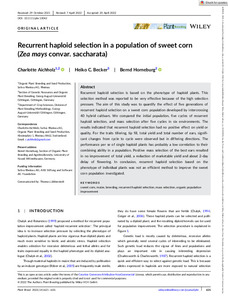Recurrent haploid selection in a population of sweet corn (Zea mays convar. saccharata)
| dc.date.accessioned | 2022-10-12T08:46:59Z | |
| dc.date.available | 2022-10-12T08:46:59Z | |
| dc.date.issued | 2022-07-31 | |
| dc.identifier | doi:10.17170/kobra-202210126972 | |
| dc.identifier.uri | http://hdl.handle.net/123456789/14183 | |
| dc.description.sponsorship | Gefördert im Rahmen des Projekts DEAL | ger |
| dc.language.iso | eng | |
| dc.rights | Namensnennung-Nicht-kommerziell 4.0 International | * |
| dc.rights.uri | https://creativecommons.org/licenses/by-nc/4.0/ | * |
| dc.subject | sweet corn | eng |
| dc.subject | maize | eng |
| dc.subject | breeding | eng |
| dc.subject | recurrent haploid selection | eng |
| dc.subject | mass selection | eng |
| dc.subject | organic population improvement | eng |
| dc.subject.ddc | 580 | |
| dc.title | Recurrent haploid selection in a population of sweet corn (Zea mays convar. saccharata) | eng |
| dc.type | Aufsatz | |
| dcterms.abstract | Recurrent haploid selection is based on the phenotype of haploid plants. This selection method was reported to be very effective because of the high selection pressure. The aim of this study was to quantify the effect of five generations of recurrent haploid selection on a sweet corn population developed by intercrossing 40 hybrid cultivars. We compared the initial population, five cycles of recurrent haploid selection, and mass selection after five cycles in six environments. The results indicated that recurrent haploid selection had no positive effect on yield or quality. For the traits tillering, tip fill, total yield and total number of ears, significant changes from cycle to cycle were observed but in differing directions. The performance per se of single haploid plants has probably a low correlation to their combining ability in a population. Positive mass selection of the best ears resulted in no improvement of total yield, a reduction of marketable yield and about 2-day delay of flowering. In conclusion, recurrent haploid selection based on the phenotype of individual plants was not an efficient method to improve the sweet corn population investigated. | eng |
| dcterms.accessRights | open access | |
| dcterms.creator | Aichholz, Charlotte | |
| dcterms.creator | Becker, Heiko C. | |
| dcterms.creator | Horneburg, Bernd | |
| dc.relation.doi | doi:10.1111/pbr.13042 | |
| dc.subject.swd | Haploidenzüchtung | ger |
| dc.subject.swd | Zuckermais | ger |
| dc.subject.swd | Züchtung | ger |
| dc.subject.swd | Effizienz | ger |
| dc.type.version | publishedVersion | |
| dcterms.source.identifier | eissn:1439-0523 | |
| dcterms.source.issue | Issue 5 | |
| dcterms.source.journal | Plant Breeding | eng |
| dcterms.source.pageinfo | 621-633 | |
| dcterms.source.volume | Volume 141 | |
| kup.iskup | false |
Dateien zu dieser Ressource
Das Dokument erscheint in:
-
Artikel [1106]


